
-
Find the right food for your petTake this quiz to see which food may be the best for your furry friend.Find the right food for your petTake this quiz to see which food may be the best for your furry friend.Health CategoryFeatured products
 Adult Small Bites Chicken & Barley Recipe Dog Food
Adult Small Bites Chicken & Barley Recipe Dog FoodSupports lean muscle for dogs who prefer smaller kibble
Shop Now Adult 7+ Small Bites Chicken Meal, Barley & Rice Recipe Dog Food
Adult 7+ Small Bites Chicken Meal, Barley & Rice Recipe Dog FoodSupports energy level and beautiful coat in mature dogs who prefer smaller kibble
Shop Now Adult Oral Care Small & Mini Chicken, Rice & Barley Recipe Dog Food
Adult Oral Care Small & Mini Chicken, Rice & Barley Recipe Dog FoodClinically proven kibble technology to reduce plaque & tartar build-up, specially designed for small & mini dogs
Shop NowFeatured products Adult 7+ Tender Tuna Dinner Cat Food
Adult 7+ Tender Tuna Dinner Cat FoodWith delicious chunks in a decadent gravy
Shop Now Sensitive Stomach & Skin Chicken & Beef Dinner
Sensitive Stomach & Skin Chicken & Beef DinnerGourmet daily nutrition, carefully made. Tasty chunks with chicken & beef in a decadent gravy. Supports digestive health, nourishes skin and promotes a lustrous fur.
Shop Now Adult Chicken & Spinach Casserole Cat Food
Adult Chicken & Spinach Casserole Cat FoodWith delicious chunks in a decadent gravy
Shop Now -
DogCat
- Cat Tips & Articles
-
Health Category
- Weight
- Skin & Food Sensitivities
- Urinary
- Digestive
- Kidney
- Dental
- Serious Illness
-
Life Stage
- Kitten Nutrition
- Adult Nutrition
Featured articles Water
WaterWater is the most important nutrient of all and essential for life. Animals can lose almost all their fat and half their protein and still survive, but if they lose 15% of their water, it will mean death.
Read More Pet Food Storage Tips
Pet Food Storage TipsWhere you store your cat and dog food can make a big difference in the quality and freshness once it is opened. Here are some common questions and recommendations for optimal storage for all of Hill’s dry and canned cat and dog food.
Read MoreHill's Australian Bushfire EffortsRead More -


Finding a lost cat on your doorstep can be a jarring experience. You no doubt want to help, but it's not always clear what kind of help a strange cat needs. She most likely belongs to one of three categories. Either she has a home that she's wandered away from, she's been abandoned and is now a stray, or she's a feral cat that has never been socialized to humans. It's important to determine which category you're dealing with before taking any action to help. If you're in the position of helping a stray cat, keep reading to learn which actions you should take.
Is the Cat Feral?
If a cat shows up on your property, it's a good idea to observe her behavior from a safe distance before approaching to offer help. Feral cats and kittens have never been socialized to humans and might bite or scratch if you try to touch them — if you're even allowed to get that close.
While a friendly, approachable cat is likely not feral, some non-feral strays are shy and wary of strangers despite being socialized, so it's not always that easy to tell the difference. Alley Cat Allies offers a few signs to help you spot a feral cat:
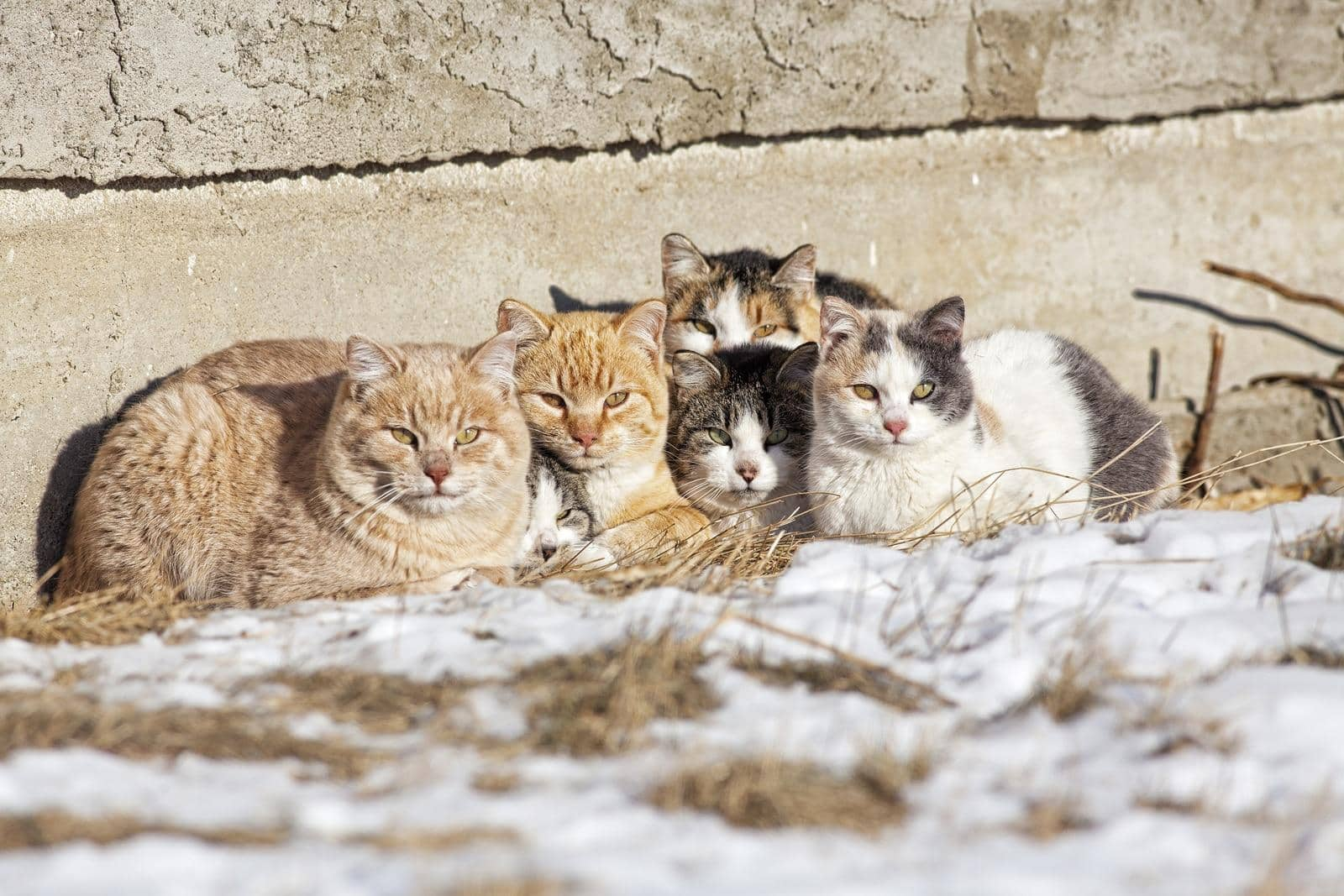
- Stray or lost cats may approach homes, cars or even people, even though they may hover at a safe distance. Feral cats, on the other hand, are more likely to run away or hide.
- Strays tend to avoid other cats, while feral cats often live in groups.
- Stray cats are likely to look at you and make eye contact, whereas feral cats tend to avoid eye contact.
- Strays are more likely to vocalize or "talk" to you. Feral cats tend to stay silent.
- Strays are primarily active during the daytime, while feral cats, though occasionally visible during the day, are more active at night.
- Strays that are used to being taken care of may have a "homeless look" about them. For example, they may be dirty or bedraggled. Feral cats are used to taking care of themselves, so they often look clean and healthy.
If you think you might be dealing with a feral cat, it's best to keep your distance. It's very likely that such a cat doesn't need rescuing. You can call your local animal control if you suspect feral cats are living near you, as they are equipped to handle these wild cats.


Tasty Tips
Lost or Stray?
After finding a lost cat and determining that she is not feral and is safe to approach, the next step is to figure out whether she is indeed simply lost or if she's a stray in need of a new home. If she's wearing a collar with ID, it's very likely that she's lost. In this case, simply call the number listed on her ID to let her owner know she's been found safe and sound. You can also call the veterinarian listed on the vaccination tag, who should be able to put you in contact with the cat's guardian.
Unfortunately, it's not always so simple. Many people don't bother putting a collar or tags on their cats, so the fact that these are missing doesn't necessarily mean that she is homeless. You can take her to a vet or animal shelter to have her scanned for a microchip, which would have her guardian's contact information — but the lack of a chip also doesn't necessarily mean you're dealing with an abandoned cat.
With no easy way of identifying to whom the cat belongs, the next step is to check lost and found ads. It's also a good idea to ask around the neighborhood to see if anyone is missing a cat, or if anyone has seen "lost cat" posters that describe the cat in question. Be sure to also check the lost and found on websites such as Craigslist, Facebook lost pet groups, lost pet databases such as PetAmberAlert.com and call your local animal shelters. People will often call their local shelters when a pet is lost, so there is a chance that the shelter will be able to help you reunite the cat with the owner.
If none of your searching turns up an owner, the final step is to place your own "found cat" ads. You can utilize your social networks. It could be that someone in your extended network knows where the kitty belongs. Again, calling your animal shelter to let them know that you have found what you think to be a lost cat, so they can contact you if the owner calls in. If you do not have the capacity to care for the cat while you search for the owner, make sure to call your local shelter and ask if you can bring the cat in. Never leave a cat at the door of a local shelter or fire station.
If You Have Pets
Dealing with finding a lost cat takes a considerable amount of time, and you may find yourself fostering your feline guest for several days or even weeks. If you already have pets in the home, keep the new kitty quarantined either until you locate her owner or you can take her to the vet for a health check and vaccinations.
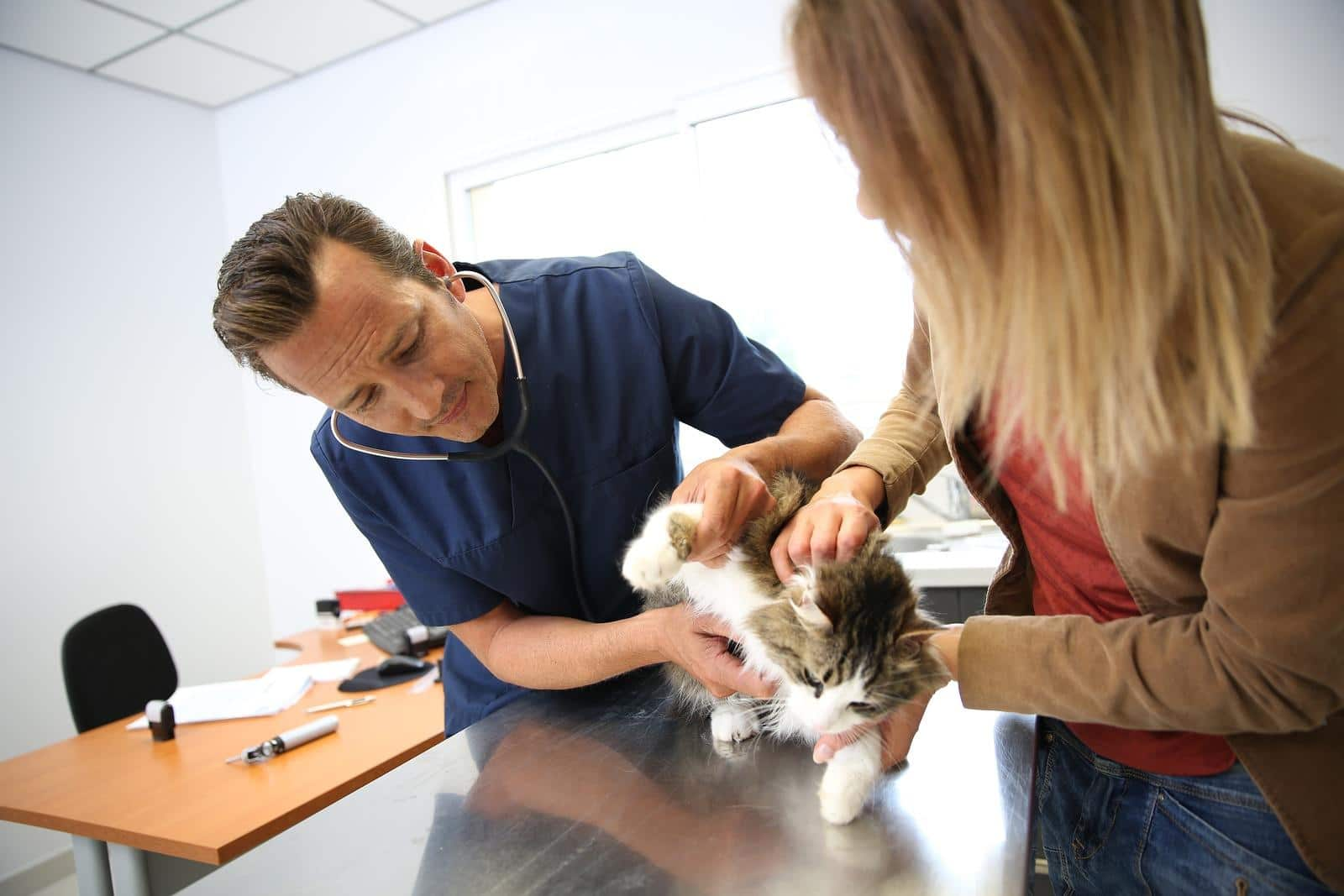
Once she gets a clean bill of health, you can slowly introduce her to your pets. On the other hand, if you have no plans to keep her, you may decide to keep her segregated for the remainder of her stay with you.
Helping a Stray Cat
If you've exhausted all your resources and failed to track down an owner, it's likely that she has been abandoned and is in need of a new home. In this case, you have a few options. You could, of course, adopt her yourself. If you do, your first step, if you haven't already done so, is to take her to the vet for a health check and to schedule vaccinations as well as spaying or neutering.
If you don't plan to keep her, you'll need to find a home for her. Start by calling local pet adoption shelters to see if there are any willing to take her. In the event that a shelter won't accept the cat, Cat Care Society recommends these steps to find a new home for your stray:
- Advertise. Start by letting friends, family and co-workers know that you're looking for someone to adopt the cat. You can also try your social networks. If those avenues fail, place fliers in veterinary clinics and pet supply stores. You can also place classified ads in newspapers and online classified sites.
- Interview prospective guardians. A few questions to ask are whether they already have any pets and what kind, if those pets are vaccinated and spayed or neutered, whether there are children in the home, and if they live someplace that allows pets. If you haven't already taken care of vaccinations and spaying or neutering, ask if the prospective guardian is willing to commit to having these procedures done.
- Arrange a meeting. Allow the cat to meet the prospective guardian under your supervision to make sure they hit it off before agreeing to hand her over.
How to Help a Feral Cat
While feral cats can generally fend for themselves, you can make life easier for them by providing cat food and water— preferably in a location that can't be easily accessed by your own pets or kids — as well as shelter from the elements. The difficulty of helping feral cats is that they tend to multiply very quickly. These cats may carry diseases, too. The problems with feeding feral cats is that it promotes their ability to reproduce, which can lead to more cats living on the street, and because feral cats tend to roam together in groups, you could be inviting more cats to your home than you anticipated.
One option to help control the feral cat population in your neighborhood, reduce the risk of infectious diseases to your own pets, and potentially find homes for adoptable kittens is trap-neuter-return (TNR). There may be volunteering opportunities in your community to help with these efforts. TNR involves trapping feral cats and kittens, having them spayed or neutered and vaccinated, and either returning adult cats to their environment or finding homes or shelters to take in kittens.
Finding a lost cat can be quite a commitment if you decide to be a good Samaritan, but it's often worth it for the peace of mind and overall good feeling that comes with helping an animal in need. Who knows? That stray cat on your doorstep just might end up becoming a cherished companion.


Jean Marie Bauhaus is a pet parent, pet blogger, and novelist from Tulsa, Oklahoma, where she usually writes under the supervision of a lapful of fur babies.
Related products

With delicious chunks in a decadent gravy

Gourmet daily nutrition, carefully made. Tasty chunks with chicken & beef in a decadent gravy. Supports digestive health, nourishes skin and promotes a lustrous fur.

With delicious chunks in a decadent gravy

With delicious chunks in a decadent gravy
Related articles
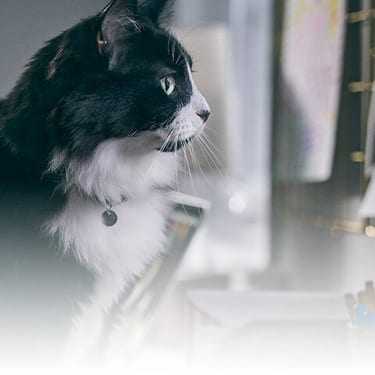
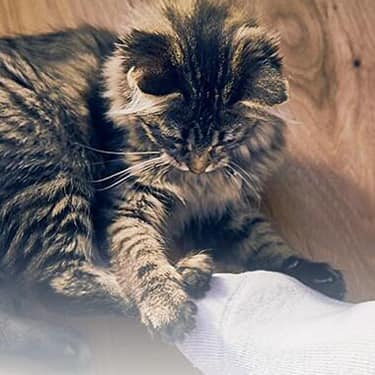
Discover which cat toys games your feline friend might like, and how they are great sources of exercise. Explore our library of articles to learn more.
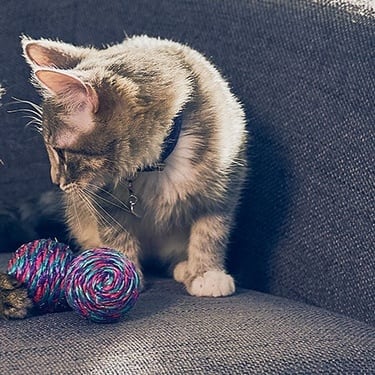
Are you looking to get your cat more active? Does she constantly look bored? Then you may want to consider using a food-dispensing (also known as treat-dispensing) cat toy, which provides both physical and mental stimulation during snack times.
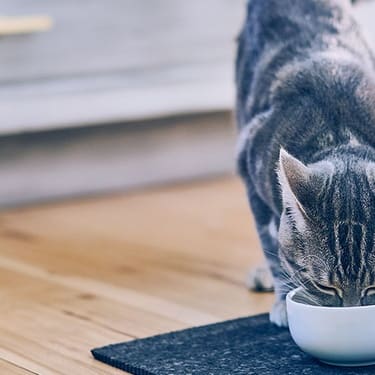
Good nutrition is about the right balance of nutrients. Learn more about health issues when feeding a cat food that has an improper nutritional balance from your friends at Hills Pet Nutrition.

Put your cat on a diet without them knowing
Our low calorie formula helps you control your cat's weight. It's packed with high-quality protein for building lean muscles, and made with purposeful ingredients for a flavorful, nutritious meal. Clinically proven antioxidants, Vitamin C+E, help promote a healthy immune system.
Put your cat on a diet without them knowing
Our low calorie formula helps you control your cat's weight. It's packed with high-quality protein for building lean muscles, and made with purposeful ingredients for a flavorful, nutritious meal. Clinically proven antioxidants, Vitamin C+E, help promote a healthy immune system.

